

Dan Gilbert: The psychology of your future self. Welcome to the Future Nauseous. Both science fiction and futurism seem to miss an important piece of how the future actually turns into the present. They fail to capture the way we don’t seem to notice when the future actually arrives.
Sure, we can all see the small clues all around us: cellphones, laptops, Facebook, Prius cars on the street. Yet, somehow, the future always seems like something that is going to happen rather than something that is happening; future perfect rather than present-continuous. Even the nearest of near-term science fiction seems to evolve at some fixed receding-horizon distance from the present. Dialogue,%20Collective%20Thinking,%20and%20Org%20Learning.pdf. How Our Delusions Keep Us Sane: The Psychology of Our Essential Self-Enhancement Bias. By Maria Popova How evolution made the average person believe she is better in every imaginable way than the average person.

About Spritz. Mintzberg's 5Ps of Strategy - Strategy Skills Training From MindTools.com. Developing a Better Strategy Learn about these five strategy definitions. © iStockphoto/kWaiGon What's your approach to developing strategy?
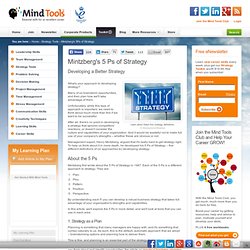
Why Do People Persist in Believing Things That Just Aren't True? Last month, Brendan Nyhan, a professor of political science at Dartmouth, published the results of a study that he and a team of pediatricians and political scientists had been working on for three years.
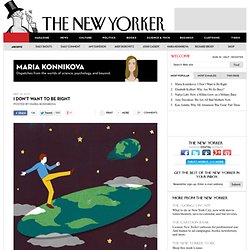
They had followed a group of almost two thousand parents, all of whom had at least one child under the age of seventeen, to test a simple relationship: Could various pro-vaccination campaigns change parental attitudes toward vaccines? Each household received one of four messages: a leaflet from the Centers for Disease Control and Prevention stating that there had been no evidence linking the measles, mumps, and rubella (M.M.R.) vaccine and autism; a leaflet from the Vaccine Information Statement on the dangers of the diseases that the M.M.R. vaccine prevents; photographs of children who had suffered from the diseases; and a dramatic story from a Centers for Disease Control and Prevention about an infant who almost died of measles.
The result was dramatic: a whole lot of nothing. Welcome to Forbes. 10 Global Values That Are Old and Stale, and How to Replace Them This Harvard Study Can Predict When You’ll Make Bad Decisions (And When You’ll Make Good Ones) 178 Flares Twitter 100 Facebook 78 178 Flares × A few years ago, I was on the hunt for some new financial investments, and doing a lot of research.

After giving it some thought, I decided to buy some individual stocks. Which specific stocks doesn’t really matter because buying them now would not be a wise bet, but for transparency’s sake, they were: Are You a Holistic or a Specific Thinker? - Erin Meyer. It was Friday afternoon in Paris and I had spent the morning teaching a group of Chinese CEOs how to work effectively with Europeans.

I asked the class: “What steps should the team leader in this case study take to manage different attitudes towards confrontation on the team?” Lilly Li, a bird-like woman with a pleasant smile, who had been running operations in Hungary for two years, raised her hand: “Trust has been a big challenge for us, as Hungarians do not take the same time to build personal relationships as we do in China.” CEO Letter. Occasionally I make reference to the "Four companies that will inherit the earth," by which I mean Amazon, Apple, Facebook and Google.
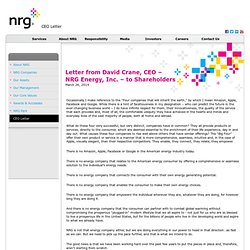
While there is a hint of facetiousness in my designation – who can predict the future in the ever-changing business world – I do have infinite respect for them, their innovativeness, the quality of the service that each provides and, most of all, the comfortable ubiquity they have achieved in the hearts and minds and everyday lives of the vast majority of people, both at home and abroad. What do these four very successful, but very distinct, companies have in common?
They all provide products or services, directly to the consumer, which are deemed essential to the enrichment of their life experience, day in and day out. What causes these four companies to rise well above others that have similar offerings? There is no Amazon, Apple, Facebook or Google in the American energy industry today.
Preparing to Win the Short, Medium and Long Term David Crane. Corporate culture: The view from the top, and bottom. Four Global Forces that will Shape Organizational Culture for the Next 50 Years. Four Global Forces that will Shape Organizational Culture for the Next 50 Years By Mark Bodnarczuk Executive Director Breckenridge Institute® Studies have shown that the forces, trends, and pace of the business environment have the single greatest influence on shaping organizational culture.
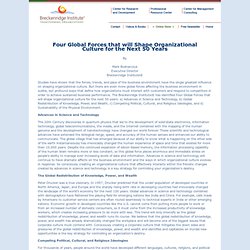
But there are even more global forces affecting the business environment in subtle, but profound ways that define how organizations must interact with customers and respond to competitors in order to achieve sustained business performance. The Breckenridge Institute® has identified Four Global Forces that will shape organizational culture for the next 50 years: a) Advances in Science and Technology, b) Global Redistribution of Knowledge, Power, and Wealth, c) Competing Political, Cultural, and Religious Ideologies, and d) Sustainability of the Physical Environment.
Advances in Science and Technology. Title - Reiman_Rollenhagen. Microsoft Word - 503ED095.doc - Howard_Ross_Fighting_the_Bias_in_Your_Brain.pdf. 8 Cultural Cognitive Biases. In HR we often rely on common sense.
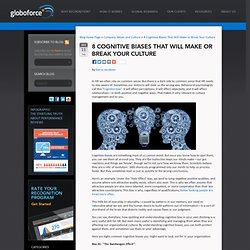
But there is a dark side to common sense that HR needs to stay aware of. Sometimes our instincts will steer us the wrong way. Behavioral psychologists call this “cognitive bias”. It will affect perceptions, it will affect objectivity, and it will affect relationships—in both positive and negative ways. That makes it very relevant to culture management and to you. Wild Cards - wildcards.[1].pdf. How to Discover Our True Core Values. What are Core Values - Uncover Core Values.pdf. STRATEGIC ASSUMPTIONS: THE ESSENTIAL (AND MISSING) ELEMENT OF YOUR STRATEGIC PLAN.
Stakeholders often approve a strategic plan without scrutinizing the strategic assumptions, the very foundation on which the plan has been built (Sound familiar?
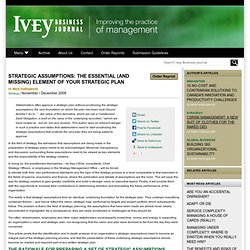
As in, “…the value of this derivative, which we call a Collaterized Debt Obligation, is built on the value of the underlying securities.” (which we have looked at…but uh..not very closely). This author sees an inherent danger in such a practice and states that stakeholders need to start scrutinizing the strategic assumptions that underlie the very plan they are being asked to approve. In the field of strategy, the admission that assumptions are being made in the preparation of strategic plans needs to be acknowledged. Moreover, transparency and discussion surrounding these assumptions need to be viewed as key elements and the responsibility of the strategy creators.
The reality is that strategic assumptions form an identical, underlying foundation for the strategic plan. Beliefs and Values. What do you hold to be true?
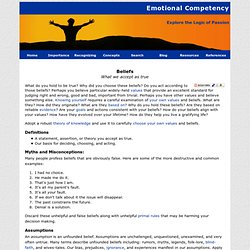
Why did you choose these beliefs? Do you act according to those beliefs? Perhaps you believe particular widely-held values that provide an excellent standard for judging right and wrong, good and bad, important from trivial. Perhaps you have other values and believe something else. Knowing yourself requires a careful examination of your own values and beliefs. Adopt a robust theory of knowledge and use it to carefully choose your own values and beliefs.